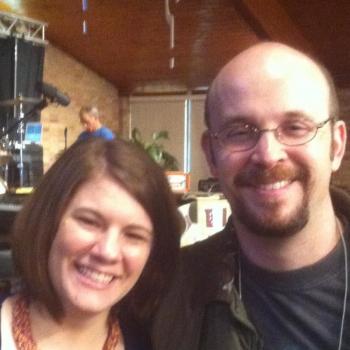I listen to a Christian hipster podcast called Homebrewed Christianity. They were recently part of a conference called Subverting the Norm where the topic was radical theology, the theology of people like John Caputo and Peter Rollins. It’s hard to tell what exactly radical theology is claiming about God. It descends from the “God is dead” theology of 50 years ago which apparently isn’t atheistic so much as it is apophatic, saying that we can’t know as much with certainty about God as we would like. Anyway, listening to the podcast today, I heard a guy talking about how the French theorist Gilles DeLeuze had opened his eyes. So I wanted to pose the question to any of my hipster theory-head readers: why should I read DeLeuze or Malabou or other contemporary European continental philosophers or for that matter Nietzsche, Heidegger, or Hegel?
I’ve read two different books that trash people like DeLeuze and say basically that any form of thought outside theology is fatally flawed: Theology and Social Thought by John Milbank and Beauty of the Infinite by David Bentley Hart. Hart was particularly brutal with DeLeuze. Milbank and Hart have complex, intelligent sounding arguments deconstructing the premises of postmodern thought (yes, I’m using the word as a catch-all).
Do I just let Milbank and Hart have the final word and rest satisfied that two guys much smarter than me have kicked secular theory’s ass so hard that it can never be resurrected (as long as you accept the terms by which they claim victory which I don’t completely understand)? One thing that bothered me about both Milbank and Hart was their lack of charitable hermeneutics. The screaming irony with regard to Hart in particular is that he argues for a theology of beauty in which God’s truth allows for an infinite array of symphonic harmonies as opposed to being a single note absolute univocity, but then Hart betrays his theory by how he treats thinkers who don’t come to univocity with his premises instead of seeing the potential for complementary harmonies despite starting from different places.
In particular, Hart’s moralistic vendetta against Immanuel Levinas was very troubling to me. Levinas gets lampooned from all sides, but I think the basic principle of his ethics is very sound. I am imposed upon by the presence of the other (any other person in my field of perception who forces me to grapple with the fact that I am not the only relevant being in the universe). Many things that we do are strategies to avoid looking into the other’s eyes, which would likely compel us to respond with empathy. Ethics, to Levinas, is how we cope with the discovery that we are not the only beings in the universe; other people exist who think they’re the center of the universe too and we’re just planets in orbit around them from their vantage point. Levinas’ ethics were critical to my discovery of the way that we make up myths to justify ourselves and our lack of compassion for others, and that this self-justification is what the justification of Jesus’ blood is supposed to kill.
So there you have it: an example of how an atheist philosopher helped me discover how to reframe an important theological problem. There have been quite a few others. Foucault’s critique of Victorian sexuality helped me to understand that the suburban American church’s obsession with sex is not only lopsided; it directly opposes our justification by faith in Christ insofar as it generates the self-justification myth we use to reassure ourselves that people who “keep it in their pants” before they’re married deserve to be wealthy, while knocked up teenage moms can’t blame anyone but themselves for their poverty. Derrida and Benjamin helped me with translation and hermeneutics. Foucault, Baudrillard, and Zizek have given me an appreciation for the demonic “world” that the gospels talk about which we project through humanity’s synergy of self-interest (aka the invisible claw of the market) but which takes on a life of its own and imposes an oppressive script on our lives for “the way things are done.” I actually talked about this last concept in a prayer meeting earlier today, so I busted out Zizek (without naming him) in an ecclesial context.
So I’ve benefited from some of these thinkers, but when I see what the enthusiasts of radical theology are writing and doing, I don’t see ekklesia. I don’t see a gathering of people whose incorporation into a mysterious story makes them a single body that exists to bring God’s love into the world. I don’t see a liturgical foundation for a movement which makes possible the society in which “those who are despised and those who are nothing bring to nothing the things that are” (1 Corinthians 1:28). I hate to say it but what I’ve seen looks like intellectual masturbation.
“To believe is human; to doubt is divine.” Yes, God is mysterious, and fundamentalists are hating God when they hate mystery. Yes, when Christians love Kant more than they love Jesus, it results in all sorts of ugliness. But how does “giving up God for Lent” make you a person more likely to stop to help a bleeding man on the side of the road or a person more likely to get goose bumps when you receive the body and blood of Christ?
In the past, a basic hypocrisy of mine is that I’ve pursued knowledge out of a furious zeal to conquer and own more truth. I’ve wanted to know more just to know more. I’m wanting to do better than that now. If DeLeuze can give me an insight that will help me better tell the story of Christ and inspire greater ekklesia and missio dei in the community that I serve, then he’s worth reading. If he’s just going to make me more arrogant and conflicted, then I’m going to pass.
Seriously though, who among the secular thinkers would be beneficial to my theological development? I’ve started hearing about Catherine Malabou. What’s the deal with her? Are there others? I got Alain Badiou’s Theory of the Subject and I can’t get through it. I understand maybe 20% of Zizek’s new beastly book on Hegel.











